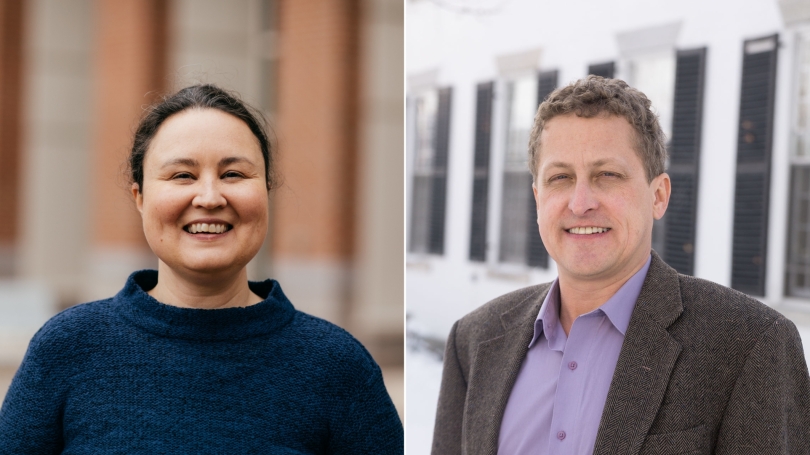
- About
- Departments & Programs
- Faculty Resources
- Governance
- Diversity
- News
Back to Top Nav
Back to Top Nav
Back to Top Nav
Back to Top Nav
Environmental studies scholar D.G. Webster and linguist David Peterson were awarded the prestigious fellowship.
Professors D.G. Webster and David Peterson have received Fulbright U.S. Scholar Program awards for the 2024-25 academic year.
Fulbright scholars engage in research and expand their professional networks abroad, often initiating scholarly collaborations and laying the groundwork for partnerships between institutions. The Fulbright U.S. Scholar Program offers awards in more than 135 countries for U.S. citizens to teach, conduct research, and carry out professional projects around the world.
"I congratulate professors David Peterson and D.G. Webster on their Fulbright Scholar awards, which were granted through a highly competitive national selection process," says Matthew Delmont, associate dean of international and interdisciplinary studies. "Their global research collaborations will foster positive change and enhance learning at Dartmouth and beyond."
Peterson, an associate professor in the Department of Linguistics, will return to Bangladesh in the fall to continue research on the country's endangered Indigenous languages—work he began 25 years ago when an earlier Fulbright award funded his first research project there.
Peterson will spend six months in residence at the University of Chattagong's Institute of Modern Languages, where he will develop a book manuscript on the grammar and lexicon of Mru, an important and under-documented Tibeto-Burman language. The project will build on research Peterson began with speakers of the language in 2004, under a CAREER grant from the National Science Foundation.
Peterson will also engage local students in his research and conduct workshops on language documentation methods and Tibeto-Burman linguistics.
"The development of curriculum in these areas is especially important in view of the current endangered status of most minority languages in the country and the need for their documentation," Peterson says. "I hope to bring my own background and skills to bear in empowering students and faculty to conduct their own language documentation and in contributing to the development of linguistics as a field of study in Bangladesh."
Webster, an associate professor in the Department of Environmental Studies, studies the dynamic evolution of environmental policy, with a particular focus on how learning and other social processes improve or impair effective environmental governance.
In the fall, Webster will spend two months in São Paulo, Brazil, where she will collaborate with researchers at the University of São Paulo and the Federal University of São Paulo to conduct research on the transition to a blue economy, which promises sustainable development through wise management of marine resources.
Webster will engage with local faculty and students who have been reviewing the literature on ocean governance globally to identify cases that demonstrate sources of success and failure in pursuit of blue economy goals. They will also collaborate with policy makers in the region to determine what lessons from these cases are most important for future policy development and to write up compelling narratives that convincingly illustrate these points.
Once back in the U.S., Webster will develop an protype interface, or Oceans Governance Toolkit, which will allow users to access the narratives and case studies developed by the team and apply the general principles of success to their own blue economy policy concerns. This interface will be tested by participants when Webster returns to São Paulo for another two months next spring.
For the second year in a row, the U.S. Department of State's Bureau of Educational and Cultural Affairs recognized Dartmouth as a Fulbright Top Producing Institution, ranking it in the top echelon of colleges and universities with the highest number of students selected for the Fulbright U.S. Student Program.
The recognition marks the second consecutive year Dartmouth has received the honor and the fifth time receiving the Fulbright Top Producing Institution for U.S. Students designation since 2009.
The Fulbright Program is the U.S. government's flagship international academic exchange program. Since 1946, the Fulbright Program has provided over 400,000 talented and accomplished students, scholars, teachers, artists, and professionals of all backgrounds with the opportunity to study, teach, and conduct research abroad. Fulbright alumni have included 41 heads of state or government, 62 Nobel Laureates, 89 Pulitzer Prize winners, and 80 MacArthur Fellows.